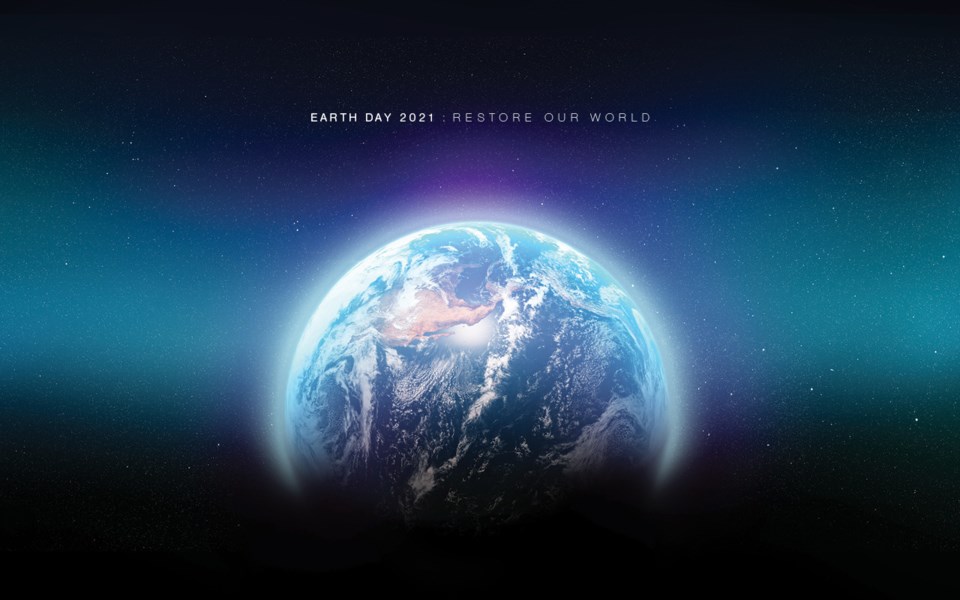“I don’t want you to be hopeful. I want you to panic. I want you to feel the fear I feel every day, and then I want you to act. I want you to act as you would in a crisis. I want you to act as if the house was on fire. Because it is.”
— Swedish climate activist Greta Thunberg at the World Economic Forum in 2019
It’s been 51 years since the first Earth Day.
In 1970 our global population was 3.7 billion; today it is 7.9 billion. We have entered a new age of the world’s development—the Anthropocene Age (2.6 million years ago to the present), where we recognize that pretty well every change going on has the fingerprint of mankind upon it. For better, or worse.
We might think that having the world go into lockdown would have helped undo some of the worst of our carbon emissions—and in the short term it did. But according to data shared with Nature magazine the news is not as good as we might expect.
In 2020 carbon dioxide emissions fell by 6.4 per cent (2.3 billion tonnes) due to the pandemic shutting parts of the global economy down. Most strongly impacted, and it’s no surprise, was the aviation sector, where emissions fell 48 per cent compared to 2019.
“Every ton of carbon that we don’t burn makes our future better. And that’s an important way of viewing this.”
— Author Michael Mann The New Climate War
“The [6.4 per cent] decline is significant—roughly double Japan’s yearly emissions—but smaller than many climate researchers expected given the scale of the pandemic, and is not expected to last once the virus is brought under control,” writes Nature’s reporter Jeff Tollefson.
According to a report by the International Energy Agency the world is now rebounding with energy-related emission two-per-cent higher in December 2020 than in 2019 driven by economic recovery. (China—which accounts for more than a quarter of global CO2 output—was the only major economy to grow in 2020.)
Closer to home many are calling for provincial and federal governments to do more—to use the pandemic as a reset button as we rev our economic engine again post coronavirus.
In this week’s federal budget there were long-term, environment-focused funding initiatives announced, adding up to a $17.6-billion “green recovery” plan the governing Liberal Party hopes will create jobs, lower emissions and support Canada’s clean-tech businesses. It did not contain any commitments to cancel fossil-fuel subsidies, however.
Tuesday’s provincial budget, despite earlier announced funding for BC parks (see page 27) was disappointing. Said David Suzuki Foundation’s director general for Western Canada Jay Ritchlin: “The province is missing the opportunity to address the climate and biodiversity crises in its focus on pandemic recovery. As emissions continue to rise, spending lacks the ambition needed to address the true scope of the climate emergency
“Overall, the balanced budget hinges on massive amounts of liquid fracked gas coming online in 2025—another huge climate miss. This inadequate plan fails to seize this once-in-a-generation opportunity to invest boldly and strategically toward a green and just recovery from COVID-19 by spending on things like rapid transit, renewable energy, natural infrastructure and transitioning workers away from fossil fuel industries.”
We know from the 2018 United Nations Report that humans must dramatically cut carbon dioxide emissions by 2030 to have any hope of reaching net-zero emissions by 2050 and keep the world from warming much past 1.5 degrees Celsius above preindustrial levels.
So today, on Earth Day 2021 across the globe, and here at home as well, the event is being marked in various ways including a virtual summit hosted by the Biden Administration to keep this battle in front of us top of mind.
“The biggest schism is that man is not a part of nature. That’s created all of our worst problems.”
— Grizzly bear advocate and wildlife writer Doug Peacock
This year’s theme is “Restore Our Earth.” It’s a fitting theme as we work to come out the other side of this pandemic where we also need to restore ourselves. It has been a long journey, parts of which have been very dark, especially when you consider our parallel pandemics in mental health and the toxic overdose drug emergency.
It is easy to feel a sense of hopelessness in facing these issues and our global climate change crisis. But we need to find hope at an individual level, a community level, a national level and for our planet.
Here in Whistler our natural environment is the fabric of our tapestry for success. Yet it is clear that our global natural environment is at a tipping point. More than 1 million species are threatened by extinction, 75 per cent of the world’s land and 66 per cent of the marine environment is significantly altered by humans.
According to the World Economic Forum, “US$44 trillion of economic value generation is moderately or highly exposed to nature loss and addressing the nature crisis could generate 395 million jobs by 2030.”
There is no escaping the fact that each and every one of us has to help slow climate change in whatever way we can. This Earth Day, and every day, remember there is only one planet Earth.




